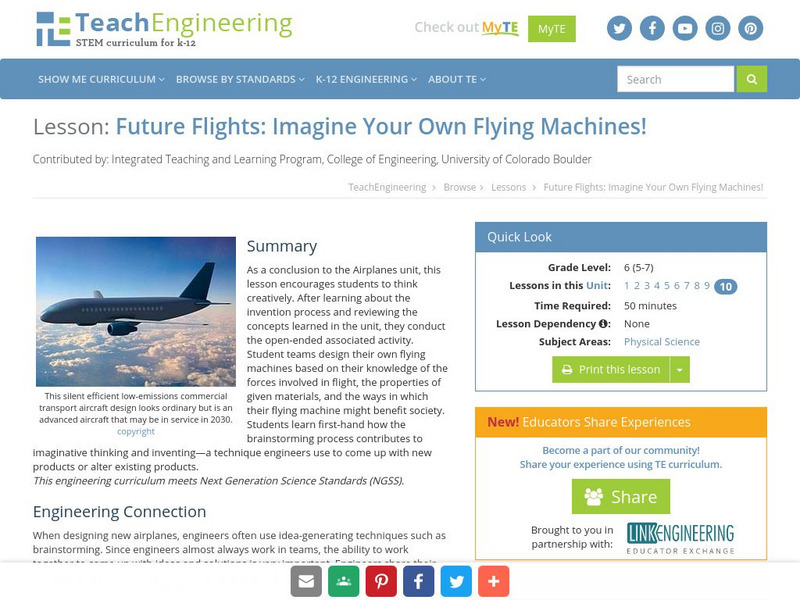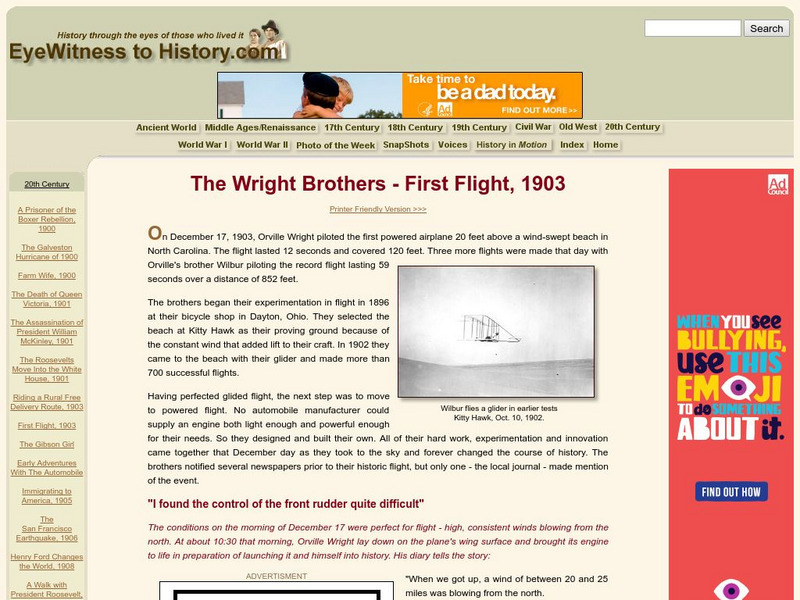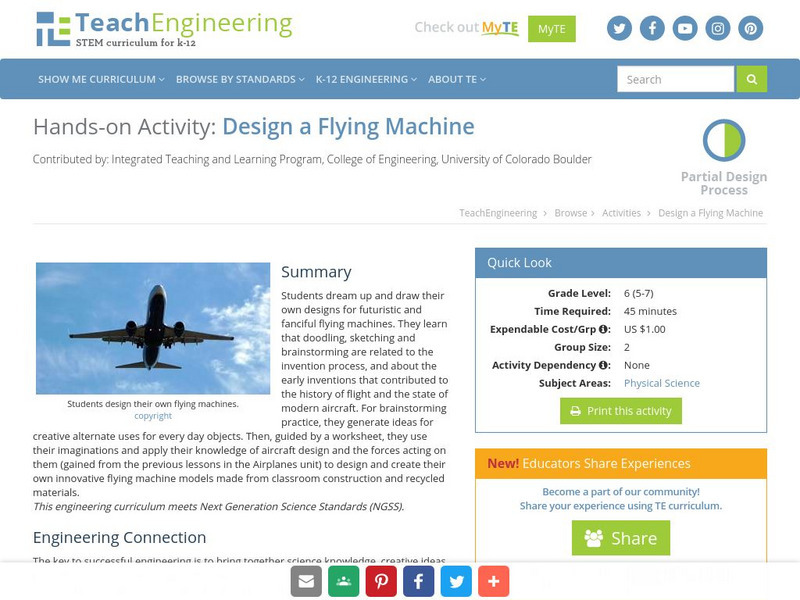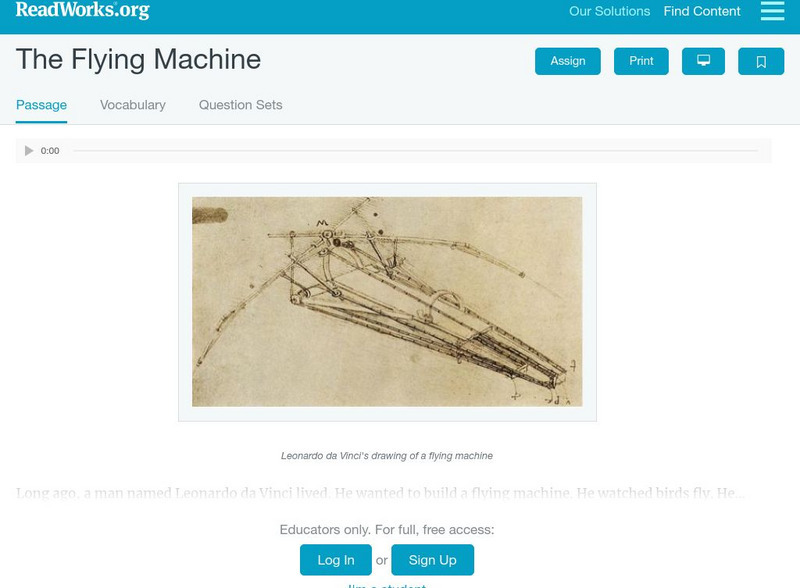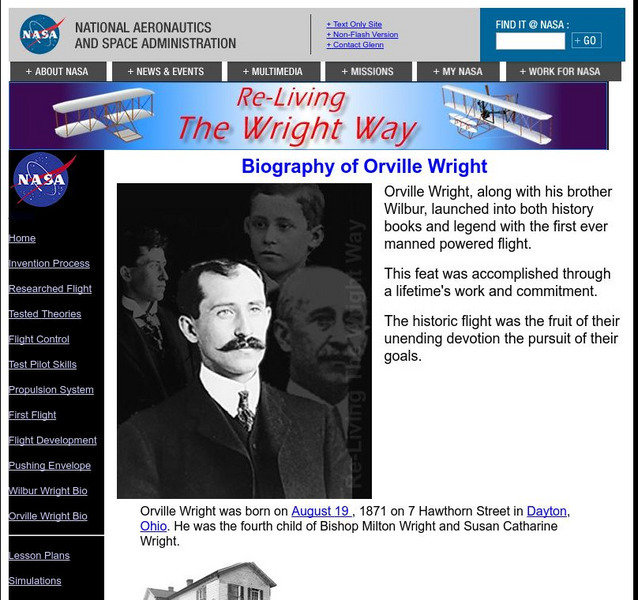Teach Engineering
Design a Flying Machine
Wrap up the unit in one final design. Pairs use their knowledge of aviation to design new flying machines and record how their designs take into consideration the forces that act upon airplanes. The pupils determine whether their designs...
Teach Engineering
Future Flights: Imagine Your Own Flying Machines!
What will flying look like in the future? The 21st lesson in a 22-part unit on aviation reviews the major aspects of the lesson. Pupils brainstorm ideas of a future flying machine.
Curated OER
Force and Gliders
Students explore physics by creating data graphs in class. For this flight properties lesson, students read the book Flying Machine and identify the force, resistance and construction necessary to keep a glider in the air. Students...
Curated OER
John J. Montgomery: Controlling flight
Students research the history of aviation while looking at how gliders and airplanes fly. This instructional activity is the perfect way to intertwine Science and History. It has variations for all grade levels K-12.
University of Wisconsin
The Why Files: On the Wing: Birds, Skeeters, Jet Planes
Evolution through natural selection governs the "design" of flying creatures. Engineers design flying machines. But flying is about physics, and physics is the ultimate arbiter of both processes, and that produces parallels in mechanical...
TeachEngineering
Teach Engineering: Future Flights!
This lesson plan is an exciting conclusion to the airplanes unit that encourages learners to think creatively. After a review of the concepts learned, students will design their own flying machine based on their knowledge of the forces...
Houghton Mifflin Harcourt
Harcourt: Biographies: Alexander Graham Bell
This biography is a great resource for information on Alexander Graham Bell. Includes links for additional information also.
PBS
Pbs: Wgbh: Nova: The Colditz Glider: Airfoil Aerodynamics
Examine what science lies behind keeping flying machines in the air. The wings angles, shape and placement, speed and what else must be considered in the development of device?
Ibis Communications
Eye Witness to History: The Wright Brothers First Flight 1903
Orville Wright's account of his and his brother's first three airplane trial flights.
TeachEngineering
Teach Engineering: Design a Flying Machine
The purpose of this activity is for the students to draw a design for their own flying machine. They will apply their knowledge of aircraft design and the forces acting on them. The students will start with a brainstorming activity where...
Read Works
Read Works: The Flying Machine
[Free Registration/Login Required] This informational text passage gives a brief history of the airplane and ideas that came before the invention. This passage is a stand-alone curricular piece that reinforces essential reading skills...
Massachusetts Institute of Technology
Mit: Inventor of the Week: Orville & Wilbur Wright
This article briefly summarizes the Wright Brothers' scientific curiosity and ambitions which fueled their desire to create the first flying machine.
Massachusetts Institute of Technology
Mit: Invention of the Week: Alexander Graham Bell
This site provides a biographical sketch of Alexander Graham Bell and his inventions. Find out about Bell's patents in addition to the telephone.
NASA
Nasa: Biography of Orville Wright
Provides an interesting biography of the life and accomplishments of Orville Wright. The highlight of this site is the terrific historic photos throughout the text.
PBS
Pbs: American Experience: The Wright Stuff
Companion website to the PBS documentary on the Wright Brothers and their contributions to aviation.







